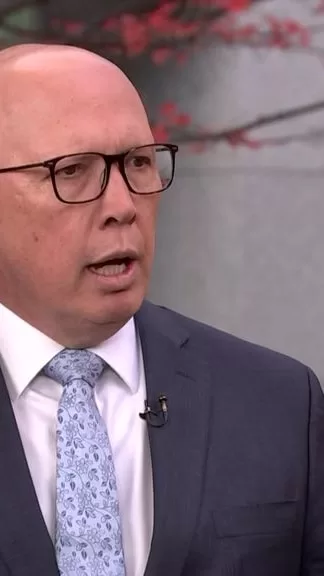- In short: Opposition Leader Peter Dutton says the Coalition will not set a 2030 climate target before the next election.
- Mr Dutton had already pledged to campaign against the government’s target, but says the Coalition remains committed to net zero emissions by 2050.
- What’s next? The next update on the government’s 2030 target is expected by the end of the year, with the last update showing it slightly behind schedule.
The Coalition will not offer a 2030 climate target ahead of the next federal election, according to Peter Dutton.
On Saturday, the opposition leader said he would campaign against Labor’s legislated target to reduce emissions by 43 per cent by 2030, arguing it was not achievable.
The Coalition’s energy spokesperson Ted O’Brien then said the Coalition would put forward its own alternative “in due course”.
But on Tuesday, Mr Dutton clarified that the Coalition would not set an alternative target from opposition.
“In terms of the targets or otherwise, we’ll make those decisions when we’re in government,” he said.
“We’ll look at the prevailing economic conditions after the next election and we’ll make announcements in due course.”
Mr Dutton said the Coalition remained committed to the longer-term target of net zero emissions by 2050, arguing the Coalition was “the only party with a credible path”.
But any watering down of the interim 2030 target would be contrary to the Paris climate agreement.
Mr Dutton has downplayed that fact, arguing the government will miss its target and so violate Paris anyway.
But the lack of an alternative trajectory would risk a further Paris Agreement breach since it could risk Australia blowing the emissions “budget” it was allocated to “spend” before 2050. The budget is a key part of the Paris commitment, in addition to the “finish line” of net zero in 2050.
Mr Dutton said his priority was on economic conditions, not on trying to “please people in Paris”.
“I’m not going to destroy the economy and send families bankrupt in the process of decarbonising the economy,” he said.
The Coalition has not outlined any alternative short-term policies to reduce emissions. However, it opposed Labor’s vehicle efficiency standard and its emissions-capping scheme for large industrial emitters.
It has promised to reveal details of a plan for nuclear power in Australia, which experts say would take at least a decade to be operational.
‘Quite a degree of confidence’ in target, Bowen says
Climate Change Minister Chris Bowen told the ABC’s RN Breakfast on Tuesday he had “quite a degree of confidence” the government would reach its 2030 target.
His department’s latest estimate shows Australia 1 percentage point shy of the target, on track for 42 per cent by 2030.
But Mr Bowen said that number did not include emissions reductions he anticipated would flow from the government’s National Reconstruction Fund, which has been set up to invest in green business initiatives.
“[The] next round of forecasts before the end of the year will obviously show the impact of what we’ve announced [and an] update on how we’re going with the implementation,” he said.
He said the Coalition would be in “clear breach” of Australia’s Paris commitments if it decided to “rip up” the 2030 target or it simply left the target in legislation and did not try to achieve it.
The Coalition’s shift has also drawn criticism from teal independent MPs, who unseated Liberal MPs from previously safe seats by running campaigns that focused on climate change.
Sophie Scamps, the member for Mackellar, accused the Coalition of “a complete U-turn” and “flip-flopping”. Allegra Spender, the member for Wentworth, said withdrawing from the Paris Agreement “would trash our international reputation and destroy investor confidence in Australia. It’s economically irresponsible and would be a disaster for the climate”.
Mr Dutton dismissed those criticisms, saying the independents were “Greens, not teals”.
